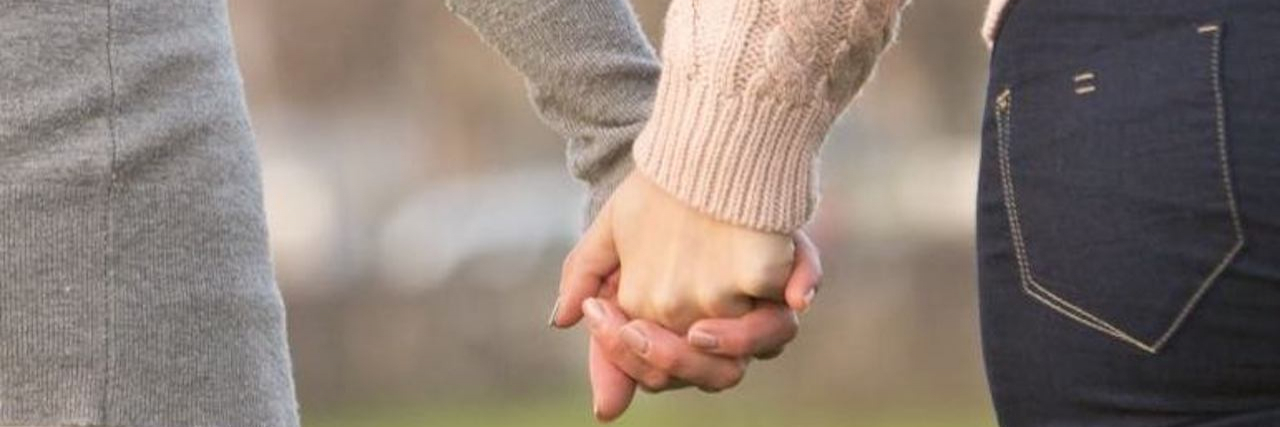What I Didn't Know About Invisible Illness Until My Daughter Became Ill
I didn’t know what invisible illness was: a condition that consumed our lives and shaped our path that no one else could see.
I didn’t truly know what an invisible illness was until my daughter Molly couldn’t stand, couldn’t go to school and was suffering silently, alone, invisibly. When she musters the strength — knowing it will come at a huge cost — to get out of her wheelchair and walk across the classroom because she can’t actually get her wheelchair past the desks and chairs and doesn’t want to speak up, ruffle feathers and point out her differences or challenges — her teacher tells her “how great she looks,” when it has nothing to do with having a better day or symptoms being improved, just making do and doing what you have to.
I didn’t know I’d need to put on a big show of getting her wheelchair out of the car or rushing to help her on the other side of the car to quell the gazes of people wondering why someone young, who doesn’t always look sick — but who still can’t walk 200 feet unassisted or without stopping — needs to park in a handicapped spot.
I didn’t know the illness would be invisible to many physicians, too. That there were no postural orthostatic tachycardia syndrome (POTS)/dysautonomia specialists here. That I could count the specialists throughout the country on one hand. That too many doctors will treat what they know, not admit what they don’t know or try to educate themselves. That a year-and-a-half in, I could have days where I feel just as alone as I did in the beginning.
I didn’t know how heartbreaking invisible illness would be for Molly — for all of us. That it would hurt and sting our little family as much as it has, swallowing us whole and holding on unrelentingly. That it would rob her of a normal teenage life of school, finding her passions, spreading her wings, dreaming big and testing limits. It would rob us of a normal family life of outings, trips, life.
I didn’t know it could strike at such a vulnerable time. When our family was already raw from a huge life change. That it would be so all-consuming. That my drivel that my husband had come to tune out would make way for recaps of Molly’s days, good and bad; doctors’ appointments, med changes — that he’d tune that out, too. That I couldn’t let her know… that she’d notice anyway.
I didn’t know it would affect every single system in her body from her skin to her GI tract. That she would barely be able to eat but gained weight from all of the steroids she’s on. That she’d have hypertension and end up in the ER because of it. That it involved so much juggling of meds, so much trial and error, so much hope and so much hope lost. That there is no cure. That they don’t even know what caused it. That because so little is known, we would resort to forums to figure out what works, ask questions, find hope, reassurance and answers. That the same doctors who didn’t understand POTS would caution us to avoid those forums.
I didn’t know that for me, as the primary caregiver, I would feel as exhausted, shackled and alone as I did when I was an overworked mom living in a new city a thousand miles from family with two little kids. I didn’t know how hard it would be to find support without judgement or advice or people seeing us hurting and wanting to “fix” a truly unfixable situation. Or that when we finally had the courage to open up, sometimes the hesitation in their voices would give away their doubt that some of this couldn’t just be fixed by making her “push through” as if every day she doesn’t push harder than most people. That to try to make us feel better, to make the weight feel lighter, to give us hope, they’d simplify it: “Make time for yourself, go have a spa day!”
I didn’t know people asking about it when it was all too heavy could feel overwhelming. I didn’t know people not asking about it could feel the same. I didn’t know it would be so hard for me to know what help to ask for. I didn’t know it would be so hard for others to know how to help.
I didn’t know how absolutely horrifyingly terrifying it could feel to watch your child slip away and not be able to help them — or even find a doctor who could.
I didn’t know that to people living invisibly — and living less of a life because of it — it means everything to finally be seen — and heard.
I didn’t know any of it.

